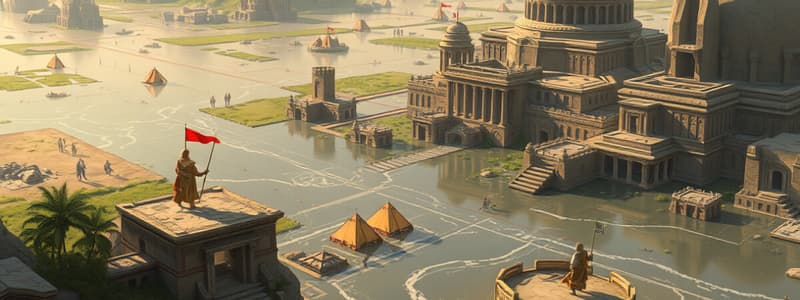Podcast
Questions and Answers
What was one of the key technological innovations that made the transport of goods easier?
What was one of the key technological innovations that made the transport of goods easier?
- Introduction of clay tablets
- Development of the sundial
- Invention of the wheel (correct)
- Creation of potter's wheel
Humans are the only species capable of using tools.
Humans are the only species capable of using tools.
False (B)
What is the shape of the hyoid bone important for in human evolution?
What is the shape of the hyoid bone important for in human evolution?
Speech
The Sumerians used a base ___ number system, influencing how we divide circles and hours.
The Sumerians used a base ___ number system, influencing how we divide circles and hours.
Match the following milestones with their significance in human evolution:
Match the following milestones with their significance in human evolution:
Which of the following statements accurately describes the Sumerians' contributions to mathematics?
Which of the following statements accurately describes the Sumerians' contributions to mathematics?
Humans obtained most of their energy for brain development from cultivated plants.
Humans obtained most of their energy for brain development from cultivated plants.
What was developed based on the cycles of the moon?
What was developed based on the cycles of the moon?
What was the primary function of ziggurats in Sumerian society?
What was the primary function of ziggurats in Sumerian society?
The Sumerians practiced monotheism, believing in one god for all aspects of life.
The Sumerians practiced monotheism, believing in one god for all aspects of life.
What were the city-states of Sumer, and how did they control their surrounding areas?
What were the city-states of Sumer, and how did they control their surrounding areas?
The Sumerians developed a system of writing known as __________.
The Sumerians developed a system of writing known as __________.
Match the Sumerian deities with their corresponding aspects of life:
Match the Sumerian deities with their corresponding aspects of life:
What solution did the Sumerians implement to combat unpredictable flooding?
What solution did the Sumerians implement to combat unpredictable flooding?
Uruk is considered one of the first true cities in the world.
Uruk is considered one of the first true cities in the world.
What materials did the Sumerians commonly trade, and what did they import?
What materials did the Sumerians commonly trade, and what did they import?
Flashcards are hidden until you start studying
Study Notes
Environmental Challenges
- Unpredictable flooding followed by droughts led to land degradation, resembling desert conditions.
- Lack of natural barriers left the region vulnerable and defenseless.
- Building materials and natural resources were limited, impacting development.
Sumerians Create City-States
- City-states functioned with political and economic authority over surrounding regions.
- Ur was a critical trade hub at the confluence of the Tigris and Euphrates rivers.
- Uruk is regarded as the first true city in human history.
A Religion of Many Gods
- Polytheistic belief system characterized by anthropomorphic gods governing various life aspects.
- Deities represented forces of nature, influencing peace, health, fertility, and natural disasters.
- Specific gods were associated with professions, such as fishing and agriculture.
- Ziggurats, step-pyramids made of sun-baked bricks, served as shrines, embodying religious devotion.
Religion and Rulers
- Early governance in Sumer was dominated by temple priests acting as intermediaries with the divine.
- Temples were central to both economic and political life in the city.
- The city’s ruler was believed to be divinely chosen and protected by the gods.
Mesopotamian Economy
- Sumerians engaged in bartering goods including wool, barley, dried fish, wheat, and metal products.
- Importation of copper, tin, and timber was essential for further development.
Solution to Environmental Challenges
- Irrigation canals were constructed to divert river water for agriculture, creating crop surpluses.
- Defensive structures like city walls were built to protect against invasions.
- Trade networks allowed Sumerians to exchange agricultural goods for raw materials.
Public Works
- Flood control measures included dikes and dams, mitigating flood damage to crops.
- Irrigation systems transported water to fields during dry spells.
Tools, Technologies, and Innovations
- Cuneiform writing system utilized a reed stylus to create wedge-shaped symbols on clay tablets.
- The invention of the wheel facilitated the transportation of goods via wheeled carts.
- The potter’s wheel enabled the creation of clay pots and jars.
Mathematics and Calendars
- Developed multiplication and division tables, and utilized geometry in calculations.
- The base-60 number system led to the division of circles into 360 degrees and time into 60 minutes.
Astronomy and Astrology
- Sumerians regularly observed celestial bodies, recording their movements and changes.
- They created a lunar calendar based on the moon's cycles.
Human Evolution Insights
- Humans are one of many species on Earth, with unique evolutionary traits.
- Misconceptions about human evolution include the idea of a linear progression toward an ultimate goal.
Key Events in Human Evolution
- 6 million years ago: Upright bipedalism emerged as a defining characteristic of hominin ancestors.
- 5.5 million years ago: Development of non-honing canine teeth transformed dietary habits.
- 2.5 million years ago: Speech capability, linked to the structure of the hyoid bone, allowed complex communication.
- 3.3 million years ago: Creation and use of tools marked the beginning of material culture.
- 1 million years ago: Dependence on hunting for animal protein facilitated brain growth and function.
- 11,000 years ago: Cultural shifts associated with the development of modern human societies.
Studying That Suits You
Use AI to generate personalized quizzes and flashcards to suit your learning preferences.




